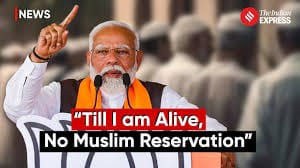New Delhi, May 31: Prime Minister Narendra Modi’s divisive comments during the Lok Sabha election campaign, alleging that several states have granted reservations in jobs and education to Muslims on religious grounds, have spurred BJP-ruled states to reconsider quota benefits for Muslims under the Other Backward Classes (OBC) category.
Following Modi’s assertions, the governments of Rajasthan and Uttar Pradesh have announced plans to review Muslim reservations after the election results are declared on June 4. Rajasthan’s Social Justice and Empowerment Minister, Avinash Gehlot, indicated that a high-power committee would be formed to examine the classification of certain Muslim groups as OBCs.
Gehlot criticized the Congress for extending OBC reservations to 14 Muslim castes from 1997 to 2013, attributing it to “appeasement politics” and claiming it was unconstitutional. Modi echoed these sentiments during election rallies, accusing the Congress of attempting to transfer quotas from Dalits, tribals, and other backward classes to Muslims.
At a rally in Telangana, Modi vowed to prevent any reallocation of OBC reservations to Muslims, citing similar actions by the Congress in Andhra Pradesh in the early 2000s. He also referenced the BJP’s decision in Karnataka last year to abolish Muslim reservations, which he claimed were taken from Scheduled Tribes and Scheduled Castes.
Uttar Pradesh Chief Minister Yogi Adityanath and Deputy Chief Minister Keshav Prasad Maurya have similarly called for a comprehensive review of Muslim OBC reservations, alleging that previous administrations had used these quotas to garner votes, which they deem unconstitutional.
The opposition Congress party has defended the reservations, arguing that they were based on socio-economic surveys and recommendations from the State OBC Commission. Congress leaders, including former Rajasthan Chief Minister Ashok Gehlot and Rajasthan State Minorities Commission chairperson Rafiq Khan, maintained that only socio-economically backward Muslim castes were granted reservations, not the entire Muslim community.
The review plans have sparked controversy and protest from groups like the All India Majlis-e-Ittehadul Muslimeen (AIMIM), which accused the BJP of targeting Muslims under the guise of social justice.
This development follows a recent Calcutta High Court judgment that struck down the OBC classification of 37 Muslim communities in West Bengal, citing political motives behind their inclusion. Rajasthan Chief Minister Bhajan Lal Sharma welcomed the ruling, condemning what he termed “appeasement politics” by the Trinamool Congress.
As the debate continues, the potential withdrawal of quota benefits threatens to push many Muslim youth back into poverty and deprivation, highlighting the contentious intersection of politics and social justice in India’s reservation policies.




